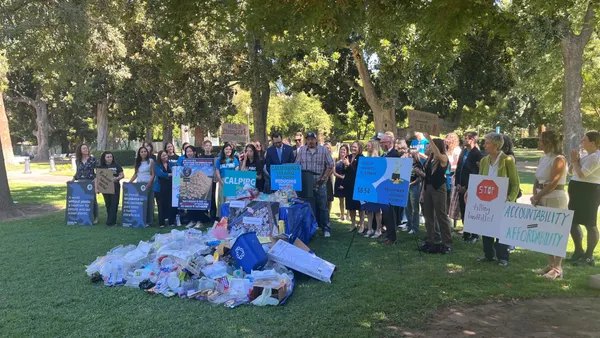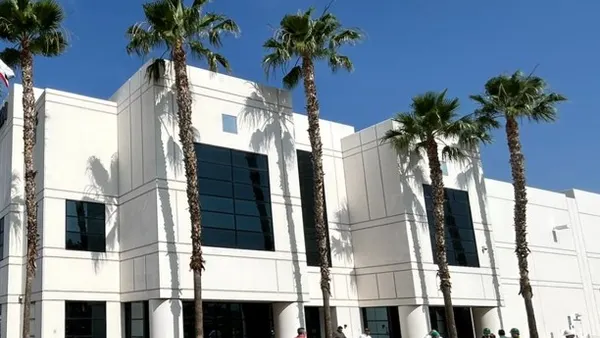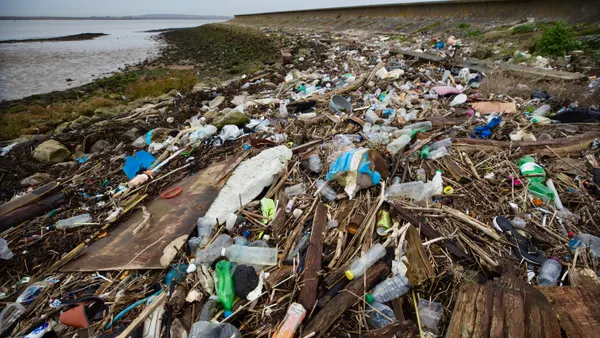Dive Brief:
- The Massachusetts Department of Environmental Protection (DEP) has approved at least nine glass disposal waivers so far, following the closure of the Ardagh bottling plant this month. Five were one-time waivers for small towns to landfill their material. DEP also granted 90-day waivers to two MRFs run by Casella Waste Systems and one waiver to Waste Management for two MRFs.
- Estimates of how much material could be disposed have increased substantially from DEP's original figures. Waste Management's waiver permits up to 1,500 tons per month. Casella's waivers cover up to 3,300 tons per month. Ardagh was using an estimated 193,000 tons of material per year and about 85% of that was cullet.
- Construction aggregate is seen as a potential, though less profitable, end market. E.L. Harvey & Sons confirmed that it had found a related short-term market, but declined further details. JRM Hauling and Recycling, which operates the GreenWorks MRF, didn't respond to a request for comment.
Dive Insight:
Strategic Materials declined to share how much material it was providing Ardagh, and is continuing to search for new markets in the Northeast or beyond. Working off publicly available statistics about the plant's operations, and knowledge that Strategic was one of its primary suppliers, this will likely affect more than 100,000 tons of material per year.
This comes at an inopportune time for Massachusetts recyclers. The DEP has already approved at least 31 single-stream waivers since November due to capacity issues and market options remain tough.
Bob Cappadona, vice president of recycling for Casella, said this new glass development only exacerbates the situation. If the average MRF's tonnage is roughly 40% mixed paper, 15% contamination and 20% glass, that leaves little to make a profit on.
"There is also a larger conversation outside of glass with what’s happening with the recycling industry," he said, adding that it will soon necessitate new discussions with municipal customers about pricing because many are now asking, "How long is this going to last? Because we can’t handle the economics for this."
Ben Harvey, president of E.L. Harvey, said even before Ardagh's closure, he was sitting on about 5,000 tons of glass. While it since has begun to move, he's not confident those markets are sustainable and said local recycling programs may be "in for a real crisis" over the next year based on larger forces, post-China.
While glass recycling has been successful in certain regions, it's still seen as a challenge for national players such as Waste Management. Brent Bell, president of the company's Recycle America division, said moving glass in the Northeast "has always been a struggle."
"Massachusetts may be just the first state that falls. If we can't get more demand for that product, then it's going to really suffer in the future," said Bell. "We generally classify glass and some other lower commodity value plastics and things like that under the same umbrella, as we've got to work on the demand side for these materials."
Bell said the average consumer likely doesn't know that glass recycling is different than say PET or aluminum, and more awareness could help increase demand for recycled content in glass products they purchase.
As this plays out, bottle bill glass is still moving due to its higher quality, and some believe that could be the ideal place for curbside material too. Recyclers like that idea, but have traditionally been resistant to bottle bills because they also pull out more desirable commodities.
"We want the PET and we want the aluminum that's left in the mix, because that's the only thing today that has any value," said Harvey.
Because the situation is still evolving, no one is ready to push for any such changes yet. The short-term waivers have bought some time. Yet few are confident that much will have changed by May 15 when they expire and more could be requested in the meantime.
Until then, municipalities seem hesitant to alarm consumers or push for any type of program changes. Boston, a Casella customer, did not provide comment on when it plans to share this information with residents. The industry's responsibility largely stops at notifying its municipal customers and letting them decide from there.
"We think people should know what’s going on," said Steve Changaris, Northeast regional manager for the National Waste & Recycling Association. "We want it to be absolutely clear that we’re interested in moving this material to markets, but they’re not there."
Glass recycling models have already changed to specialized collection or drop-off solutions in other states, but no one wants to make that decision lightly because behavior is hard to influence. For example, New York City temporarily dropped glass and certain plastics in the early 2000s and its diversion rates have never fully recovered.
As some Massachusetts cities look at wholesale revamps of their recycling programs, these market realities will need to be a factor, and ideally any changes around glass or other commodities would be communicated all at once.










